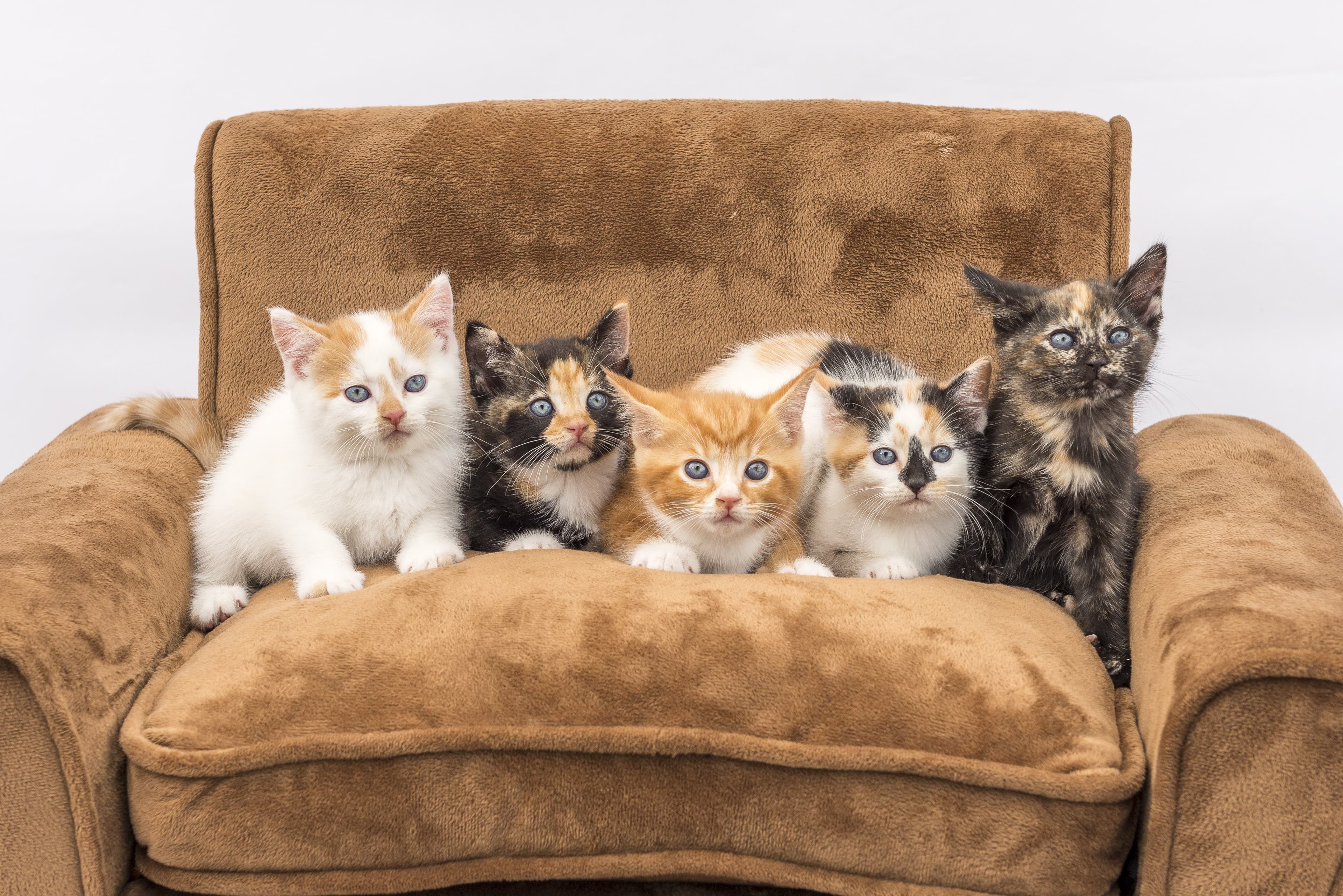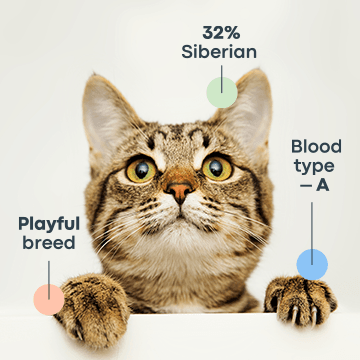Are you considering adopting a kitten? Or, maybe you’ve already got one, but you’re not entirely sure about the best food and care to give them. In either case, it’s important to know how old your kitten is. In this post, we’ll help you figure out how old your kitten is and how to discover the secret to staying on top of your ever-growing kitten’s health.
Signs For Determining A Kitten's Age

Eyes
The easiest way to determine whether or not a kitten is still quite young is by looking at its eyes. Kittens don’t open their eyes for the first 10 days of their life. If you’re looking to adopt a kitten but aren’t sure of their age, a quick check of their eyes will help you know if it’s too soon for them to leave their family.
Umbilical Cord Stump
Does your kitten—or the kitten you’re interested in adopting—still have their umbilical cord stump? If so, then you’re looking at a kitten that’s pretty new to the world and likely less than a week old. Kittens typically lose their umbilical cord around seven days old.
Ears
You might be wondering how a kitten's ears could help you to determine how old they are. While it might sound strange, a kitten’s ears tell us quite a bit. A kitten that’s only a few days old can be identified by folded ears. As they get older, you’ll start to see their ears, “open” and look more cat-like. However, some cats, like the Scottish Fold, keep their folded ears for life!
Weight
Weight is also helpful for telling a kitten’s age. As kittens get older, they grow. According to the ASPCA, for kittens that are in good body condition, a 1-pound kitten is typically about 4 weeks old and a 3-pound kitten is about 12 weeks old. This is because their weight in pounds is associated with their age in months, with weight gain occurring at a relatively predictable weight until the kitten reaches 5 months of age.
Teeth
We can learn a lot from a kitten’s teeth. They start out with baby teeth and then get permanent teeth, just like humans do as they age. Baby teeth are recognizable by their pointed tips, whereas permanent teeth have flatter edges and are a bit bigger or wider. A kitten’s baby teeth will start to come in around 3 weeks of age, but you’ll start to see their permanent teeth come in around 3-4 months.
Behavior
Newborn kittens generally need lots of sleep. Even the most adventurous kittens lack full coordination, and as a result, their walking is a bit awkward. By 3 weeks of age, a kitten should be walking normally and start playing with (and pouncing on) their family members.
How To Tell A Kitten's Age Week By Week

Newborn
Eyes: Newborn kittens' eyes are closed. Because they can’t see, they rely on other senses such as smell.
Teeth: Pink gums without teeth.
Weight: 50-150 grams.
Behavior: A newborn kitten needs to sleep and that’s what it will do for most of the day. Newborns will crawl rather than walk. A healthy newborn will also “speak” when it’s picked up.
Care needed: It’s important to keep a newborn close to its mother. In the first 2 days of a kitten's life, its nursing mother will provide it with colostrum, which enables the kitten to fight disease. What if the kitten is an orphan? You’ll have to take over the role of its mother through bottle or syringe feeding. A newborn kitten needs to receive food every 2 hours.

1 week
Eyes: At one week old, a kitten's eyes are still not open.
Teeth: No teeth yet.
Weight: 150-250 grams (should have doubled in size).
Behavior: A week-old kitten still sleeps for most of the day, but should be growing stronger. A healthy week-old kitten will be able to hold its head up and move it around slightly.
Care needed: A kitten can’t regulate its own body temperature, so you have to make sure that they get the warmth they need beyond the warmth it gets from cuddling with its mother and littermates. Kittens need the temperature of their environment to be about 85 °F (29 °C). An orphan kitten should be bottle-fed every 2-3 hours, which includes feeding them overnight.

2 weeks
Eyes: By the age of 2 weeks, a kitten’s eyes will start opening and the color of their eyes will be blue.
Teeth: Still no teeth, but they will start to appear soon.
Weight: 250-350 grams.
Behavior: A two-week-old kitten is learning coordination and developing movement skills. You’ll notice the kitten trying to walk and is moving around a lot more.
Care needed: There’s still a need to create a warm environment for the kitten. You can, however, start to lower the surrounding temperature to 80 °F (26 °C) instead of 85 °F (29 °C). At this age, it is safe to have your kitten dewormed as recommended by your veterinarian. Bottle-fed kittens must be fed every 3-4 hours (including overnight).

3 weeks
Eyes: Their eyes should now be fully open, and they’ll be able to see better as their eyesight continues to develop.
Teeth: Now is when their teeth will start to emerge. The incisors are the first set of teeth to appear on the scene (they’re tiny teeth situated at the front of the mouth).
Weight: 350-450 grams.
Behavior: At 3 weeks, kittens have a keen desire to explore and play. Their motor skills will be improving, and they’ll be able to walk more easily.
Care needed: You can adjust the temperature of the kitten's environment to 75 °F (23 °C), as they won’t be as dependent on an external heat source. Bottle-fed kittens should now be fed every 4-5 hours and will still need to be fed overnight. They should be able to start learning how to use the litter box.

4 weeks
Eyes: A kitten’s eyes are open and depth perception is improving.
Teeth: The kitten's canine teeth (next to the incisors) will start to push through the gums.
Weight: 350-450 grams.
Behavior: By now, a kitten’s motor skills have improved and it’s learning to run, walk, and play without much effort.
Care needed: Four-week-old kittens still need their warmth, but will only require an external heat source when they’re resting.You’ll need to keep their environment between 70 °F (21°C) to 75 °F (23°C). Orphans need food every 5 hours (yes, this includes overnight feeding). They will also want to socialize a bit more than usual.

5 weeks
Eyes: Still developing, but should be functioning well.
Teeth: The premolars are now developing and will begin to emerge. A kitten's premolars are an indication that they are ready to eat wet foods.
Weight: 550-650 grams.
Behavior: At 5 weeks, a kitten will want to taste just about everything! It’s possible that a kitten may even try to eat its litter, so it is important to monitor them and consider what they can access and ingest.
Care: Weaning is very important when a kitten is 5 weeks old. An orphaned kitten should receive food every 5-6 hours. Once a kitten has been successfully weaned, provide them with food and water that they can access whenever they need it.

6 weeks
Eyes: Eyes will typically remain blue in color. Vision is fully developed.
Teeth: Almost all baby teeth will have emerged.
Weight: 650-750 grams.
Behavior: Six-week-old kittens are active and love to experience the strange new world around them. They will be playful and adventurous, but will also need a lot of sleep.
Care: It’s important to start socializing kittens at this age. If you don’t socialize your kitten by its sixth week of life, it will make the kitten very difficult to train.

7 weeks
Eyes: A kitten's permanent eye color will start developing. For most cats, this means that their blue eye color will start to change. However, some cats, such as the Siamese, Persian, and Himalayan, keep their blue eyes forever!
Teeth: All baby teeth have emerged.
Weight: 750-850 grams.
Behavior: You’ll want to keep an eye on your kitten. Seven-week-old kittens are less dependent on you, and their coordination is very good.
Care: By now, the kitten should be fully weaned and have access to their food and to fresh water throughout the day. Start to acclimate yourself and your kitten to steps for good oral hygiene, such as introducing them to a cat toothbrush. Learn more about 5 ways to brush your cat's teeth.

8 weeks
Eyes: Their true eye color will have fully developed.
Teeth: Adult canine teeth are developing.
Weight: 850-950 grams (your kitten weighs enough to be neutered).
Behavior: Incredibly adventurous and daring.
Care: Eight-week-old kittens can be put up for adoption. However, these kittens still have much to learn and can do a bit more growing. Vaccinations are quite important at 8 weeks to keep your kitten healthy, so be sure to schedule wellness visits with your veterinarian.

9 to 12 weeks
Eyes: Permanent eye color is fully developed.
Teeth: Baby teeth will be fully grown, and adult teeth will begin to emerge.
Weight: 950 grams – 1.3 kgs.
Care: Your kitten is still quite small, so you’ll want to watch where you walk and keep an eye on what your kitten is up to. Kittens can continue to be fed a species-appropriate diet, which may consist of wet food as well as dry food, or a combination of both.

12 to 16 weeks
Teeth: Adult teeth will start to push out baby teeth.
Weight: 1.3kgs – 1.8kgs.
Behavior: At 16 weeks, a kitten is set on exploring their surroundings, just as much as they were at a few weeks old.
Care: Considering your kitten's adventurous spirit, you’ll need to provide an environment for your kitten to play in that’s safe and appropriately suited for their needs.

17 weeks and older
Teeth: Adult teeth have fully developed.
Weight: Around 1.8 kgs.
Behavior: Your kitten should be growing in leaps and bounds, both mentally and physically.
Care: Socializing is still important. You can continue to slowly introduce your kitten to new people and other animals, but be mindful of their reactions and body language. There’s no need to force anything.
Now you know everything about how to tell your kitten's age and care for them every step of the way! You may also enjoy reading the ASPCA’s downloadable PDF titled, “How Old Is That Kitten?” that summarizes some of what we covered in this blog.
Support Your Kitten's Health With Basepaws

Basepaws DNA tests give you a wealth of actionable information that helps you stay in control of your kitten's health. You want to know your kitten better—inside and out—and the Basepaws Breed + Health DNA test lets you do just that. Learn about your kitten’s breed profile in relation to 21 top purebred breeds. Gain insight on 25 genetic traits associated with your kitty’s unique appearance and behavior, as well as potentially life-saving information about their blood type and likelihood of resistance to Feline Immunodeficiency Virus (FIV).
In addition to 43 genetic diseases, Basepaws screens your kitty’s oral health for their current risk of having periodontal disease, halitosis, and tooth resorption. These painful issues are difficult to see, and poor oral health puts your furry family member at risk for heart, kidney, and other health conditions. Gain peace of mind with Basepaws and get ahead of diseases before they become advanced—so that your kitten can live a better life, even longer.





